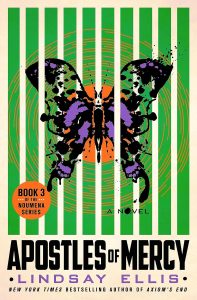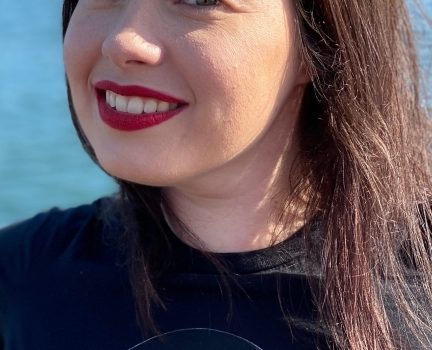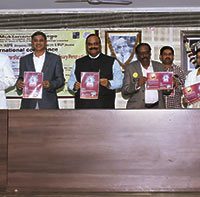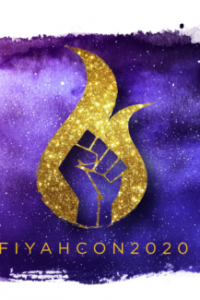Spotlight on: Lindsay Ellis

Your novel Apostles of Mercy is the third book of your Noumena series. Tell us about the world, and the story so far.
The basic conceit of the series is an alternate history where the reveal about secret government shenanigans hiding alien activity becomes a big public scandal in George W. Bush’s America, resulting in a timeline that is both very different to the real world yet trods much of the same path; the stock market still crashes, and nascent political movements all over the globe are handed a blessing in the form of a very real alien Other to be afraid of. The world doesn’t end, Earth doesn’t get invaded (yet), but still eventually must face a hostile advanced alien civilization.
The series follows Cora Sabino, who interprets for Ampersand, the only member of his kind who is able to decode human language. Together they navigate the complicated world of the aliens’ social hierarchy, politics, and their own difficult relationship.
By the beginning of Apostles of Mercy, it is late 2009 and human civilization has shown its ass enough to convince both of them that it is not only hopeless, it does not deserve to be saved. So, the two are in the early stages of preparing to escape altogether, but before they can, the amygdalines’ sister species reveals that a small number of them have also been using Earth as their host as well, and are, you might say, fiercely territorial.
 Your series combines elements of SF with alternate history. Why did you choose to set the books in a version of our near past instead of the future?
Your series combines elements of SF with alternate history. Why did you choose to set the books in a version of our near past instead of the future?
With sci-fi you usually see two versions of a “contemporary” setting – either it’s set in a definite time period like mine is, or it’s set in what I like to call the “generic now” – it’s a universe that shares most things in common with ours, but important details will be different – the president is usually fictitious, a year is never mentioned, and major relevant news events (like the pandemic or the war in Israel) are not mentioned and are implied not to have happened at all. The president is usually played by an older white guy (or Morgan Freeman), and can fairly easily be swapped out with whoever happens to be president in the real world.
In super early drafts my series was set in the “generic now” complete with generic, fictitious locales, fictitious presidents, fictitious pop culture references and companies (for instance a fictional Google-alike instead of Google itself), but the election of Donald Trump and the subsequent pandemic kind of obliterated the whole concept of a “generic now,” at least one where current events or politics are involved. How can one write a book about a government cover up with a guy who is incapable of both keeping secrets and feeling shame at all in office? How can one integrate political decorum as a plot point when decorum is a thing of the past? Moreover, the era of the Internet celebrity whistleblower is one that had a beginning and an end, and would not make sense in a “generic now” based in the current era.
It was then that I began thinking in terms of when could this story happen, what is the latest year it could happen? And my honest answer is–it couldn’t happen. I don’t think there is any way the government could involve this many people and keep something like “we have living captive alien specimens in a basement in Riverside, CA” a secret in the 70’s, let alone well into the 2000’s. So, it became less about historical feasibility and more about examining a period in history, a period both after an event of great historical significance (9/11 and the rise of the Internet) and right before another major shift in technology and culture (social media, smart phones, and the rise in global fascism we are currently enjoying).
You’re a successful novelist now, but your background is in media, with degrees in cinema studies and film and television. How does that grounding in audiovisual arts influence your written work?
It makes me shape stories with visuals at the back of my head, the sort of thing that become iconic cultural touchstones, but thinking of things visually also helps shape the story in screenwriting.
In addition to your writing, you also regularly create video essays, podcasts, and other media content. What’s your favorite of the work you’ve produced, and what’s on the horizon?
Right now, the plan is just to focus on writing, but I’ll continue to produce videos for Nebula when inspiration strikes. We recently released a video about the breakup of the Beatles and the life and career of Yoko Ono, and why women like her tend to become cultural punching bags even though they do not deserve it. My co-writer/editor and I are both very passionate about the Beatles and we worked really hard on that one, so we’re particularly proud of that project.
Is there anything else you’d like our readers to know?
Mostly that I’m where I want to be. I left YouTube because I’d wanted to for a long time, and that phase of my life had run its course. Working on these books is very much where my heart and mind are right now.
 While you are here, please take a moment to support Locus with a one-time or recurring donation. We rely on reader donations to keep the magazine and site going, and would like to keep the site paywall free, but WE NEED YOUR FINANCIAL SUPPORT to continue quality coverage of the science fiction and fantasy field.
While you are here, please take a moment to support Locus with a one-time or recurring donation. We rely on reader donations to keep the magazine and site going, and would like to keep the site paywall free, but WE NEED YOUR FINANCIAL SUPPORT to continue quality coverage of the science fiction and fantasy field.
©Locus Magazine. Copyrighted material may not be republished without permission of LSFF.








